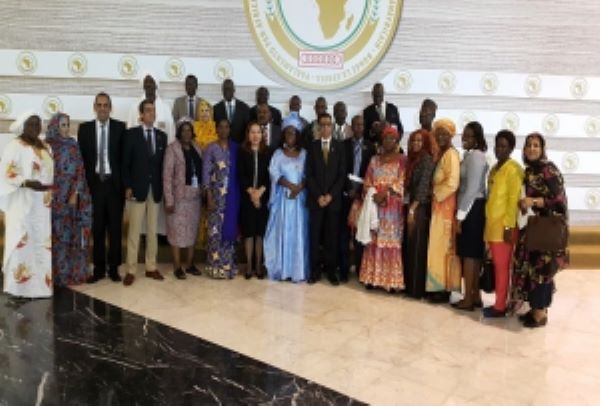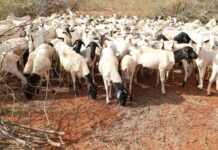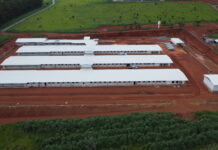
The Pan-African Parliament (PAP) has adopted the Model Law on Food and Nutrition Security in Africa.
The adoption of this model law comes at an opportune time in the year 2022, the Year of Nutrition and Food Security, as declared by the African Union Assembly. With its conceptual roots in the African Union Agenda 2063 and the United Nations Sustainable Development Goals, the model law is a tool for African countries to establish or revise legislative and regulatory frameworks to ensure access to nutritious food for all.
Presenting the model law during its plenary session on 09 November 2022 in Midrand, South Africa, the Deputy Chair of the PAP Committee on Rural Economy, Agriculture, Natural Resources and Environment, Hon. Mahamat Saleh Khayar noted that the law can serve as a model normative framework highlighting the best legislative principles and practices promoting healthy diets and better nutrition. He added that the model law promotes a framework for permanent dialogue between stakeholders in the food sector on the allocation of substantial budgetary resources to implement food security and nutrition policies and programmes and on coordination and policy coherence between actors and agencies involved in the fight against malnutrition.
In a statement read at the preparatory technical consultation workshop on 5-6 November 2022, on behalf of the Food and Agriculture Organization of the United Nations (FAO) Subregional Coordinator for Eastern Africa, Chimimba David Phiri noted the importance of the model law to support efforts by member states in transforming food systems in the continent. “The model law is a significant contribution to member states in their efforts to put in place long-term frameworks to tackle food security and nutrition challenges in Africa. The continent is facing a worrying situation where in the under 5 children category, about 60 million suffer from stunting, 14 million suffer from wasting and where nearly 430 million Africans live in extreme poverty and cannot afford the cost of a healthy diet. FAO stands ready to continue supporting PAP in the rolling out of the model law through its national level technical assistance and capacity development activities.”
The model law is a normative framework highlighting the best legislative principles and practices that promote healthy diets for better nutrition. In terms of content, the model law covers key issues of Food Security and Nutrition (FSN), such as access to productive resources, agricultural inputs and services, measures to promote a balanced diet and fight malnutrition, regulation of food market and trade, including import and export of food, food safety standards and authority, and regulation of food labelling, amongst others.
It follows a human rights-based approach to FNS and combines rights, responsibilities and entitlements with governance arrangements for coordination and implementation and accountability mechanisms.
Before its adoption, the draft law underwent two rounds of regional consultations over two years and has drawn inputs from parliamentarians, civil society actors and representatives of ministries in charge of food and agriculture from Central, Eastern, Northern, Southern and Western African countries, as well as from the staff of the AU Commission and PAP. A final technical consultation also sought views of experts from the AU Commission, the African Union Commission on International Law (AUCIL), ADUA-NEPAD, FAO and the World Food Programme (WFP), the African Commission on Human and Peoples’ Rights (ACHPR) as well as African academic and civil society organizations. The technical inputs were integrated into the document before submission to the Plenary for adoption.
The formulation of the model law
Despite remarkable progress in some African sub-regions and countries, the overall food security and nutrition situation in Africa still lags behind the global trend. In response, over 100 parliamentarians from across Africa reiterated their commitment to food security and nutrition and established the Pan-African Parliamentary Alliance for Food Security and Nutrition (PAPA-FSN) at the second ordinary session of the fourth Parliament of the Pan-African Parliament in May 2016
Immediately after the launch of PAPA-FSN, a Memorandum of Understanding was signed between PAP and FAO, sealing their strategic partnership. This was followed by a technical cooperation project on “strengthening the capacity of parliamentarians in Africa for an enabling environment for food security and nutrition, including the right to adequate food.“ The main outputs of the project include supporting PAPA-FSN to advocate and support the implementation of FSN framework laws at all levels.
On 2 November 2018, in Kigali, Rwanda, PAP Plenary, approved the formulation of a model law on food and nutrition security in Africa and mandated the Committee on Rural Economy, Agriculture, Natural Resources and Environment and PAPA-FSN to coordinate its development. Accordingly, the Committee on Agriculture and PAPA-FSN, in collaboration with FAO, prepared a draft guidance document on a regional model law on FSN in Africa. In October 2019, the PAP plenary endorsed a draft of the model law for regional consultations. Regional consultations in the five regions of Africa were held in two rounds in November 2019 and November 2020.
Related links:
New Pan African Parliamentary Alliance for Food Security and Nutrition







